
The Union for a Popular Movement was a liberal-conservative political party in France, largely inspired by the Gaullist tradition. During its existence, the UMP was one of the two major parties in French politics along with the Socialist Party (PS). The UMP was formed in 2002 as a merger of several centre-right parties under the leadership of President Jacques Chirac. In May 2015, the party was succeeded by The Republicans.
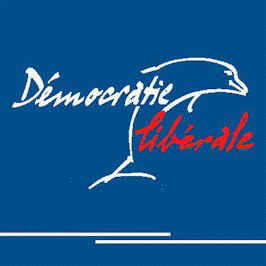
Liberal Democracy was a conservative-liberal political party in France existing between 1997 and 2002. Headed by Alain Madelin, the party replaced the Republican Party, which was the classical liberal component of the Union for French Democracy (UDF).

The Union for French Democracy was a centre-right political party in France. The UDF was founded in 1978 as an electoral alliance to support President Valéry Giscard d'Estaing in order to counterbalance the Gaullist preponderance over the political right in France. This name was chosen due to the title of Giscard d'Estaing's 1976 book, Démocratie française.
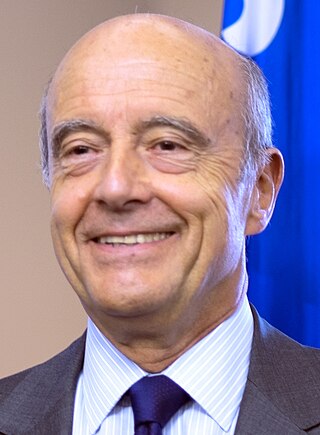
Alain Marie Juppé is a French politician. A member of The Republicans, he was Prime Minister of France from 1995 to 1997 under President Jacques Chirac, during which period he faced major strikes that paralysed the country and became very unpopular. He left office after the victory of the left in the snap 1997 legislative elections. He had previously served as Minister of Foreign Affairs from 1993 to 1995, and as Minister of the Budget and Spokesman for the Government from 1986 to 1988. He was president of the political party Union for a Popular Movement (UMP) from 2002 to 2004 and mayor of Bordeaux from 1995 to 2004.
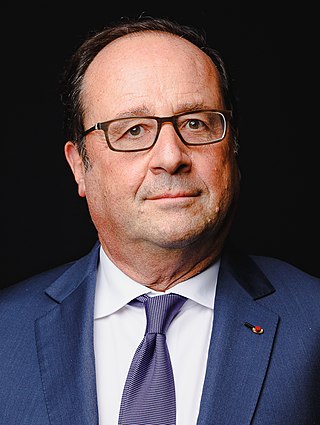
Regional elections in were held in France on 21 and 28 March 2004. At stake were the presidencies of each of France's 26 regions which, although they do not have legislative powers, manage sizeable budgets. The results were a triumph for the parties of the left, led by the French Socialist Party (PS) in alliance with minor parties, including the French Communist Party (PCF), the Left Radical Party (PRG) and The Greens. The left has usually fared moderately well in regional elections, but this was their best result since the regional system was introduced.

François René Jean Lucien Bayrou is a French politician who has presided over the Democratic Movement (MoDem) since he founded it in 2007. A centrist, he was a candidate in the 2002, 2007 and 2012 presidential elections. He has also presided over the European Democratic Party (EDP) since 2004.

The Republican Party was a liberal conservative political party in France founded in 1977. It replaced the National Federation of the Independent Republicans that was founded in 1966. It was created by the then-President of France, Valéry Giscard d'Estaing. It was known to be conservative in domestic, social and economic policies, pro-NATO, and pro-European.
The Centrists, known as The Centrists – New Centre since 2018, formerly known as New Centre and European Social Liberal Party, is a centre-right political party in France formed by the members of the Union for French Democracy (UDF) – including 18 of the 29 members of the UDF in the National Assembly) – who did not agree with François Bayrou's decision to found the Democratic Movement (MoDem) and wanted to support the newly elected president Nicolas Sarkozy, continuing the UDF–Union for a Popular Movement (UMP) alliance.

Municipal elections were held in France on 11 and 18 March 2001. These elections were marked by a setback for the left and a victory for the right one year before the 2002 presidential election. However, the capital, Paris and the second largest city, Lyon both switched to the left.

The French municipal elections of 2008 were held on 9 and 16 March to elect the municipal councils of France's 36,782 communes. The first task of each newly constituted municipal council was to elect a mayor.
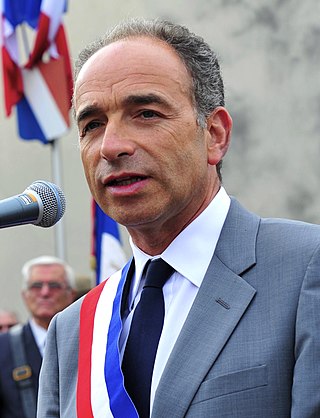
Jean-François Copé is a French politician serving as Mayor of Meaux since 1995 with an interruption from 2002 to 2005. He was Government Spokesman between 2002 and 2007, when assumed other tenures in the government—including Minister of the Budget—at the same time. He also served as the member of the National Assembly for the 6th constituency of Seine-et-Marne and president of the Union for a Popular Movement (UMP) group in the National Assembly. In November 2010 he became the party's secretary-general. In August 2012 he announced that he would run for the presidency of the UMP, facing the former Prime Minister François Fillon.
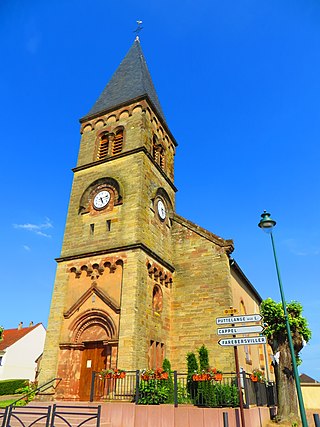
Henriville is a commune in the Moselle department in Grand Est in north-eastern France.
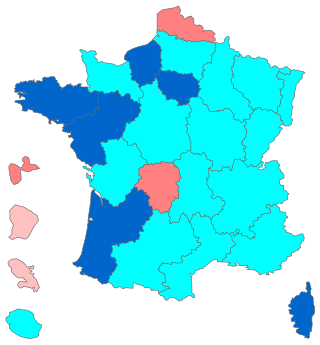
Regional elections were held in France on 16 March 1986. These were the first regional elections in France. French left-wing parties promised the establishment of regional governments in the 1970s. When the Socialist Party was elected to government in 1981, they implemented territorial reform.

Philippe Augier is a French politician. He is a member of the New Centre.

Regional elections were held in France on 14 and 21 March 2010. At stake were the presidencies of each of France's 26 régions, which, though they do not have legislative autonomy, manage sizable budgets.

The National Centre of Independents and Peasants is a right-wing agrarian political party in France, founded in 1951 by the merger of the National Centre of Independents with the Peasant Party and the Republican Party of Liberty.
Modern and Humanist France is a recognized movement within the Union for a Popular Movement (UMP). It was created in August 2012 and it is led by Jean-Pierre Raffarin, Luc Chatel, Jean Leonetti and Marc Laffineur.

Sarkozysm (Sarkozysme) is the name commonly given to the policies and political agenda of former French President Nicolas Sarkozy, including his presidential policies between 2007 and 2012. It can also refer to the supporters of Nicolas Sarkozy within the centre-right Les Republicains (LR).

The 2004 Union for a Popular Movement leadership election was held on November 28, 2004 to elect the leadership of the French Union for a Popular Movement. The congress was organized after the UMP's first president, Alain Juppé, was forced to resign from the party's presidency following his conviction in a corruption scandal.
This page lists public opinion polls conducted for the 2002 French legislative elections, which were held in two rounds on 9 and 16 June 2002.



















